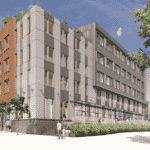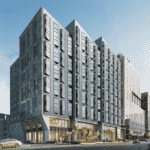
Allston Development Gets $58M Financing After Fast Lease-Up
An Allston co-living project that’s 97 percent leased just 10 months after tenants started moving into its shared living spaces obtained $58 million in permanent financing.

An Allston co-living project that’s 97 percent leased just 10 months after tenants started moving into its shared living spaces obtained $58 million in permanent financing.

City officials hoped developers would build more units per acre and pass along the savings to residents. It hasn’t turned out that way, and it’s an open question whether the pilot that permitted around 2,000 units in three years will come back.

Boston’s newest co-living complex opened in January in Allston. And a prominent developer has figured out how to make it work. But city officials have put a pause on more housing developments like this.

Developers are expanding plans to convert a former Nubian Square bakery into a co-living community, with the latest version calling for 94 units and projected rents up to 60 percent below conventional apartments.

The spread of the coronavirus could lead to permanent changes in commercial real estate, including increasing reliance on remote working, online shopping and medtech integration, JLL predicts.

A 278-bed co-living development in Allston and 451-unit private student housing complex in the Fenway moved a step closer to groundbreaking.

An advisory group is supporting developers’ plans for a co-living complex at 525 Lincoln St. in Allston, including a 20 percent affordability component and ban on undergraduate residents and short-term rentals.

Developer Scape’s revised plans for the Fenway neighborhood call for three residential towers containing 1,357 units, including a 220-unit affordable housing tower at 2 Charlesgate West.

As resiliency and mobility issues approach crisis proportions in Greater Boston, Amy Korte is using technology to optimize designs and operations of new developments. Korte was named president of Arrowstreet, the Boston-based architecture firm that she joined in 2008, in May.

While the Boston market holds interest for co-living project operators, the city presents challenges from a regulatory perspective. Boston’s zoning code is complicated, with many neighborhoods, in effect, having their own zoning ordinances.

Living with roommates is nothing new in Allston, but now a development team is moving forward with a large-scale project specifically designed to accommodate group housing arrangements.

Boston’s biggest experiment with “co-living” is looking a bit more companionable.

For Millennials who miss the camaraderie of dorm living – or empty-nesters looking for a livelier environment than suburban single-family homes – National Development’s 7INK by Ollie project will offer a new breed of housing in Boston.